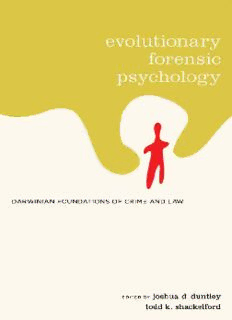
Evolutionary Forensic Psychology: Darwinian Foundations of Crime and Law PDF
Preview Evolutionary Forensic Psychology: Darwinian Foundations of Crime and Law
EVOLUTIONARY FORENSIC PSYCHOLOGY This page intentionally left blank EVOLUTIONARY FORENSIC PSYCHOLOGY Darwinian Foundations of Crime and Law Edited by Joshua D. Duntley and Todd K. Shackelford 2008 Oxford University Press, Inc., publishes works that further Oxford University’s objective of excellence in research, scholarship, and education. Oxford New York Auckland Cape Town Dar es Salaam Hong Kong Karachi K uala Lumpur Madrid Melbourne Mexico City Nairobi New Delhi Shanghai Taipei Toronto With offi ces in A rgentina Austria Brazil Chile Czech Republic France Greece G uatemala Hungary Italy Japan Poland Portugal Singapore S outh Korea Switzerland Thailand Turkey Ukraine Vietnam Copyright © 2008 by Oxford University Press, Inc. Published by Oxford University Press, Inc. 198 Madison Avenue, New York, New York 10016 www.oup.com Oxford is a registered trademark of Oxford University Press All rights reserved. No part of this publication may be reproduced, stored in a retrieval system, or transmitted, in any form or by any means, electronic, mechanical, photocopying, recording, or otherwise, without the prior permission of Oxford University Press. Library of Congress Cataloging-in-Publication Data Evolutionary forensic psychology : Darwinian foundations of crime and law/ edited by Joshua D. Duntley, Todd K. Shackelford. p. ; cm. Includes bibliographical references and index. ISBN: 978-0-19-532518-8 1 . Forensic psychology. 2. Evolutionary psychology. I. Duntley, Joshua. II. Shackelford, Todd K. (Todd Kennedy), 1971– [ DNLM: 1. Evolution. 2. Forensic Psychiatry. 3. Adaptation, Psychological. 4. Crime—psychology. 5. Crime Victims. 6. Genetics, Behavioral. W 740 E93 2008] RA1148.E98 2008 614'.15—dc22 2007051354 9 8 7 6 5 4 3 2 1 Printed in the United States of America on acid-free paper Dedications Joshua Duntley dedicates this volume to Helena and Paula. Todd Shackelford dedicates this volume to Viviana, Helayna, Avelina, Rex, Ethan, and Mackenzie. v This page intentionally left blank Preface Evolutionary Forensic Psychology is not a completely accurate title for this volume. It may suggest to some readers that the topics explored here are representative of a subdiscipline of the fi eld of forensic psychology. This is not the case. Evolution by natural selection is the only known process capable of generating the complex adap- tations that compose the human mind. Because all psychological mechanisms owe their existence to evolutionary processes, there is no such thing as a nonevolution- ary forensic psychology. All forensic psychology is inherently evolutionary, whether or not it is explicitly acknowledged. Our understanding of forensic psychology can benefi t from knowledge of the causal processes that designed our psychological mechanisms. T he book is titled Evolutionary Forensic Psychology because the profoundly im- portant insights that evolutionary perspectives provide are relatively new. This vol- ume presents a critical introduction to the application of evolutionary perspectives to prominent issues in forensic psychology, exploring theories and research fi ndings that will help to move the fi eld of forensic psychology rapidly forward. Forensic psychology encompasses a large and diverse range of issues. In con- structing this volume, we sought contributions from experts on topics that are of the greatest relevance to the fi eld. Each chapter demonstrates how evolutionary logic has enriched our understanding of topics and generated new hypotheses and research fi ndings, progress that would not have occurred without the unique contribution of a Darwinian perspective. Although most of the chapters explore the nature of psychological mechanisms that produce criminal behavior, an evolutionary perspective has the power to inform research across domains of forensic psychology. It can help us to differentiate between crimes resulting from psychopathology and those that are the product of cognitive adaptations functioning as they were designed to function. It can help us to under- stand the origins and evolved functions of cognitive adaptations that produce crime and the psychological mechanisms that generate the perception that some behaviors are criminal. An evolutionary perspective also can inform our understanding of why some crimes are considered to be worse than others, why some people are thought to deserve longer sentences than others who committed the same crime, and why vii viii Preface sex differences are pervasive in the commission and perceptions of crime. Current and future forensic psychological research informed by an evolutionary perspective will have an impact on the prevention of crime, how laws are written and enforced, how clinical forensic psychologists and forensic psychiatrists evaluate criminals, the selection of juries and the methods of presenting information to them, and the kinds and structure of punishments in the penal system. The ultimate goal of this volume is much more ambitious than to provide information about how evolutionary theory can inform forensic psychology—we hope it will provide a spark that will ignite theo- retical innovation and new programs of research in this important area. Acknowledgments We would like to thank the contributors for their brilliant work in the outstanding chapters they wrote for this volume. Our special thanks go to Professor David M. Buss for his mentorship in evolutionary psychology and its application to the dark side of human nature. We would also like to thank Andy Thomson for his insightful feedback during the conception of the volume and on early drafts of the introduc- tory chapter of the book. We extend our gratitude to our editor, Lori Handelman, assistant editor, Jenna Hocut, and production editor, Angelique Rondeau, at Oxford University Press for their insights and support during the production of the volume. Finally, we would like to thank our families for their enduring patience and support, which made it easier for us to spend hours away from them to complete work on this book. ix
Description: